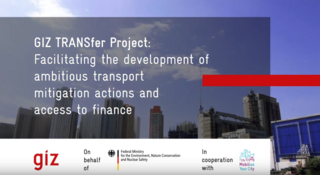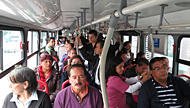Enabling climate-friendly transport

The IKI project TRANSfer supports measures worldwide to foster climate-friendly transport
The project "Towards Climate-Friendly Transport Technologies and Measures (TRANSfer)" has been implemented in several phases since 2010. Activities range from replacing old minibuses with new vehicles in the Philippines and a national investment promotion programme for sustainable urban transport in Peru to establishing a new cycling infrastructure in Colombia.
TRANSfer supports developing countries and emerging economies in strengthening their commitment to climate-friendly transport and motivates international donors to invest more in this sector. It is being financed in the context of the International Climate Initiative (IKI) of the German Federal Environment Ministry (BMUB). Worldwide, transport causes about 25% of energy-related CO2 emissions. Achieving the two-degree target will require a change of habits and extensive decarbonisation in the transport sector.
TRANSfer has implemented numerous effective programme approaches. For example, it provided advisory support to the Indonesian Government regarding the feasibility and financial viability of a new urban transport programme (NAMA SUTRI). Now the programme has 14 million euros in international climate finance and 17 million euros in funding from the Indonesian Government. In Colombia, the initiative is providing technical and financial support to implement a truck-scrapping programme via Colombian funding of USD 600 million. TRANSfer has also launched a multi-donor Mobilise Your City (MYC) initiative with other partners including the French development agency AFD (Agence Française de Développement). It is an initiative of the UNFCCC Marrakech Partnership for Global Climate Action and aims to foster climate-friendly urban mobility in 100 cities across 20 countries and to give international donors the opportunity to invest in NDC implementation in the transport sector. Moreover, TRANSfer promotes the exchange of experience between partner countries at events, such as the annual Transport and Climate Change Week in Berlin.
The following projects are already being implemented or are planned in the Philippines, Peru and Colombia.
Philippines: TRANSfer was instrumental in conceptualising a reform programme to modernise local public road transport in the Philippines. Part of the modernisation includes regulatory market interventions aimed at consolidating fleets and routes, renewing fleets, professionalising operations, and fostering financial sustainability. The government will provide 60 million euros for the pilot phase between now and 2018. Over the next six years, the country-wide fleet will be renewed, with about 220,000 ‘jeepneys’ (military jeeps converted into minibuses) being replaced by new vehicles. The private sector is providing a large share of the financing. The project will cut nearly one MtCO2 annually in the metro area of Manila alone.
Peru: The TRANSfer initiative also led to the development of the TRANSPerú NAMA (Nationally Appropriate Mitigation Action), which is a package of urban transport measures being implementedwith the support of the Deutsche Gesellschaft für internationale Zusammenarbeit (GIZ) GmbH, the Kreditanstalt für Wideraufbau (KFW) and other actors. Total funding of 110 million euros is being provided. With the help of a national investment programme, medium-sized cities will receive support to plan and make the required investments to provide sustainable urban transport. The Peruvian Government, too, has earmarked several hundred million euros in the country's budget for the programme.
Colombia: As part of its strategy to achieve climate targets in the transport sector, the Colombian Environment Ministry explicitly cites the NAMA TAnDem (NAMA for Active Transport and Demand Management) in its new climate strategy. The NAMA TAnDEM receives support from TRANSfer and will promote the development of a cycling infrastructure and incentives for using alternatives to cars in 17 of the most important cities in Colombia. In a pilot phase in Ibagué and Pereira, local working groups are being established and training and online courses are offered on parking space management and on structuring the technical and financial aspects of bike rental systems. In Ibagué, a mobility master plan is being prepared with support from a mobile app provided in cooperation with the Innovation Centre for Mobility and Societal Change (InnoZ) in Germany. Also planned for this year is a training course on developing infrastructure for bicycles and a pilot project on redesigning junctions with high accident rates. By 2030, NAMA TAnDem will achieve a GHG reduction amounting to about 1% of Colombia’s total emissions in the transport sector.
The link has been copied to the clipboard
Contact
IKI Office
Zukunft – Umwelt – Gesellschaft (ZUG) gGmbH
Stresemannstraße 69-71
10963 Berlin











![[Translate to English:] Die Petronas-Türme im Stadtbild Kuala Lumpurs; Foto: Unsplash/Ishan](/legacy/_processed_/f/8/csm_180215_ishan-seefromthesky_Header310_661e6fc5b9.jpg)

